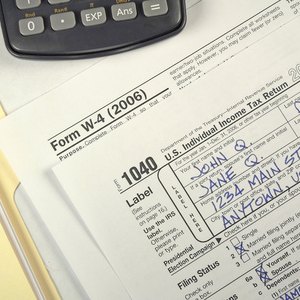
If you are exempt from withholding taxes from your paycheck, you will be required to pay the full amount of any taxes that you owe when you submit your tax return. The IRS does not penalize individuals for not withholding taxes, but recommends that people pay throughout the year instead of paying a lump sum once a year.
Withholding
Withholding is when employers deduct a specified amount of money from every paycheck and submit that amount to the IRS in the employee’s name. The IRS terms withholding a “pay-as-you-go” system, which it believes to be easier for most people than lump-sum payments. If your employer sends too much to the IRS, you get the balance back as a tax refund.
W-4s
Most employees are required to set up withholding when they start a new job. At that point, your employer will give you a W-4 form, which is a worksheet that determines how much of your paycheck should be sent to the IRS. Some employees can exempt themselves from withholding, especially if they owed no taxes in the previous year or are temporary employees.
Payments
If you do not withhold taxes from your paycheck, you will still have to file a tax return for every tax year. If you did not withhold, chances are that you will have to pay your taxes in one lump sum to the IRS when you file. If you have the resources and financial planning to do so, there is no penalty. However, if you cannot pay your taxes in one payment, you will have to make multiple payments, and most likely pay interest.
Self-Employment
Business-owners, contract workers and other self-employed individuals do not fill out W-4 forms and hence do not have withholding. If you are self-employed and expect to pay at least $1,000 in taxes, the IRS requires you to pay estimated tax. Estimated tax is due every three months and takes the place of withholding for self-employed individuals; the IRS may fine you if you are supposed to pay estimated tax and do not.
References
- IRS: Publication 505
- Taxpayer Advocate Service, "Vol. 2, TAS Research and Related Studies: A Conceptual Analysis of Pay-As-You-Earn (PAYE) Withholding Systems as a Mechanism for Simplifying and Improving U.S. Tax Administration," Page 11. Accessed April 1, 2020.
- Internal Revenue Service. "Understanding Taxes -- Theme 2: Taxes in U.S. History." Accessed April 1, 2020.
- Internal Revenue Service. "Form W-4," Accessed April 1, 2020.
- Tax Foundation. "State Individual Income Tax Rates and Brackets," Pages 1–10. Accessed April 1, 2020.
- Social Security Administration. "Contribution And Benefit Base," Accessed April 1, 2020.
- U.S. Congress. "H.R. 748 - CARES Act." Accessed April 1, 2020.
Writer Bio
Calla Hummel is a doctoral student studying contraband in international political economy. She supplements her student stipend by writing about personal finance and working as a consultant, as well as hoping that her investments will pan out.

